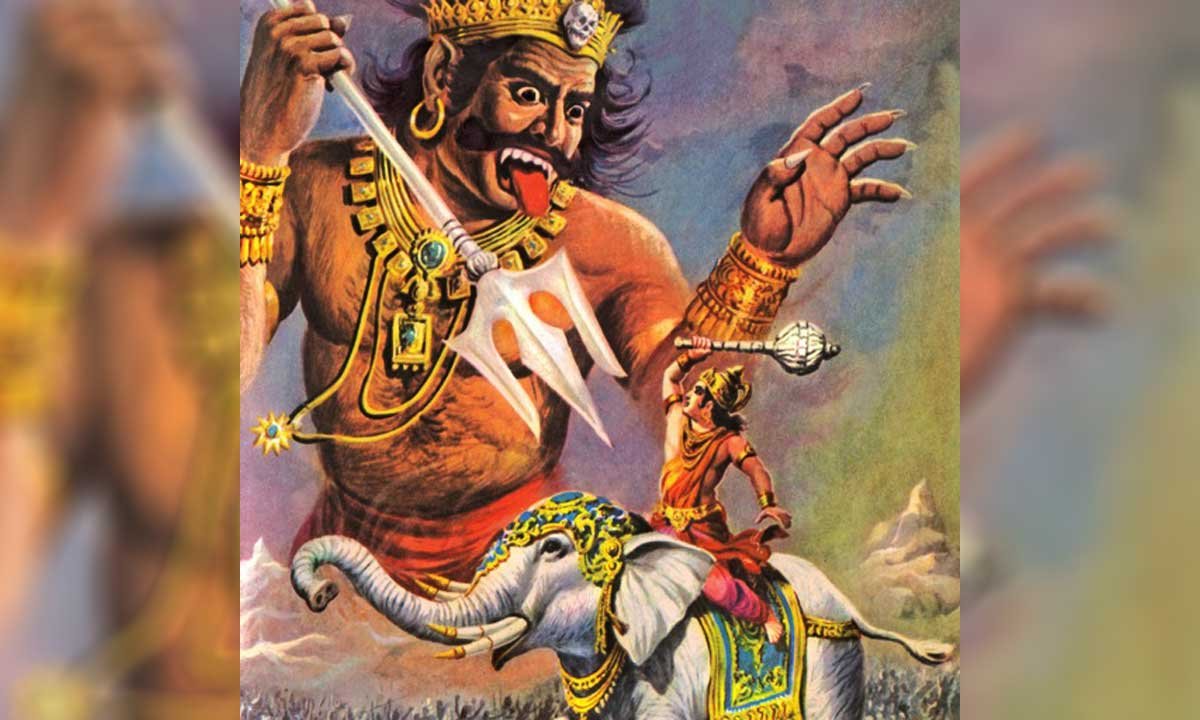
There used to be a teacher across from my house; he was a writer and also a scholar, but no one used to like him because he was very arrogant and cruel. At the same time, he was a staunch worshiper of God; every morning without fail, he used to visit temples, and there used to be soothing mantra chanting music in his house. Once a stray cat entered his house, he brutally trolled her and threw her out of his balcony without bothering for its life. I asked my grandmother how a God-fearing man could do so. She then told me the story of one very spiritual demon called Vritrasura.
In Kaliyuga, God and goddesses are very much in the people around us; those who have wisdom, kindness, an inclination to charity, and serve mankind are God-like people, and the Monks around us are like Rishis (sages). And teachers, like people, are demons, and there are various types of demons that we see from day to day. The idea of mythological epics is to teach you a way of life.
Well, I asked my grandmother. If a person has been doing sin all his life and suddenly one day starts doing some good deeds, then will God not punish him for his sin? If he is being punished for his sin, then what about the good deeds he did? My granny said, “One has to pay for all the good and bad karma they do; for example, for whatever sin this man has committed, God may make him a dog in the next birth, but since he has done some deeds, the Dog would be a pet for a rich family.” Karma needs no address; it reaches wherever it has to give you the outcomes.
Despite being a demon, Vritrasura was a preeminent bhakti-yogi. He was created in a sacrificial fire to fight Indra, the king of heaven. Vritrasura was so powerful that he collided with terror and was able to fight an army of demigods by himself. What makes Vritrasura so magnificent, however, is not his enormous strength as a fighter, but rather his level of spiritual elevation. Vritrasura was an illustrious bhakti-yogi able to propound deep mystical knowledge even in the midst of a fight for his life. Sometimes a person born into an underprivileged family may be spiritually progressive, and someone born into a reputable family may be spiritually unsighted. Spirituality is an individual’s virtue. Spiritual progress carries on from life to life. Vritrasura was King Chitraketu in his previous life, but when he was born as the demon Vritrasura in his next life, he carried his spiritual advancement with him. Krishna states in the Gita (2.40) that our progress on the path of bhakti-yoga is never lost or diminished, and even a little progress can save us from the greatest danger, securing for us a greater opportunity for spiritual progression in our next life.
Sage Vishwarupa, who was serving as a poojari (priest) to the gods, had three heads. Both the gods and the Asuras were his relatives. While offering clarified butter in the sacrificial fire of yajna in the names of gods, he also offered oblations to demons secretly. When Indra came to know about this, he got furious and cut off the three heads of Vishwarupa. Knowing this, Vishwarupa’s father, Tvasta, vowed to kill Indra to avenge the murder of his son.
Tvasta performed a yajna. He offered oblations in the sacrificial fire, saying, “O enemy of Indra, flourish to kill your enemy without delay.” Thereafter, from the southern side of the sacrificial fire, known as Anvāhārya, came a fearful personality who looked like the destroyer of the entire creation at the end of the epoch. The body of the demon grew day by day. Soon, he covered all terrestrial systems. Therefore, he was named Vritra, one who covers everything.
So Vritrasura was born with a purpose; he strokes Indra with an iron mace and disarms him, and Indra loses the courage to fight. All the gods under the leadership of Indra attacked him with their weapons, but Vritrasura swallowed all their weapons. The fearful gods then ran away and went to the refuge of Lord Vishnu. They praised him. Lord Vishnu, pleased with their acclamations, advised Indra to approach Sage Dadhichi. Because of the austerity and the Narayana Kavacha, his body was very strong. Therefore, only a weapon made from his bones was useful to kill Vritrasura.
In Spite of all the gathered forces, Indra was losing his strength to fight. Vritrasura then begins a logical discourse with Indra and encourages him to keep fighting. During their discussion, Vritrasura reveals his status as an advanced bhakti yogi. The slaying of Vritrasura is considered the biggest achievement of Indra. Vritra, knowing that he was going to die soon, called out with immense devotion to Sri Hari and said, “O Lord, I am waiting for you like a baby sparrow would wait for her mother, like a calf would wait for the cow, like the wife would wait for the husband!” He then addressed Indra and said, “O Indra! Strike me down so I can be reunited with my Lord.” And when Indra struck Vritrasura down, a bright light came from his body and merged with Sri Hari.
Thus, in this beautiful story, Sri Hari shows us how much he loves his devotees, no matter who they are. We have many such Vritrasuras, resourceful Indras, and supremely authoritative Vishnu-like entities, we all have our roles to play and will one day leave this body. Human conduct is what remains forever, rest everything is perishable. So just by judging someone by his or her outer looks, one cannot predominately predict anything.
(Any suggestions, comments or dispute with regards to this article send us on feedback@afternoonvoice.com)

